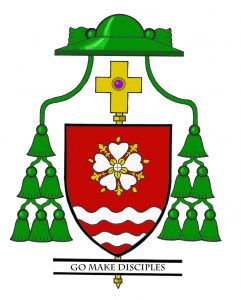Coadjutor Bishop Louis Tylka reflects on his first year in the Diocese of Peoria
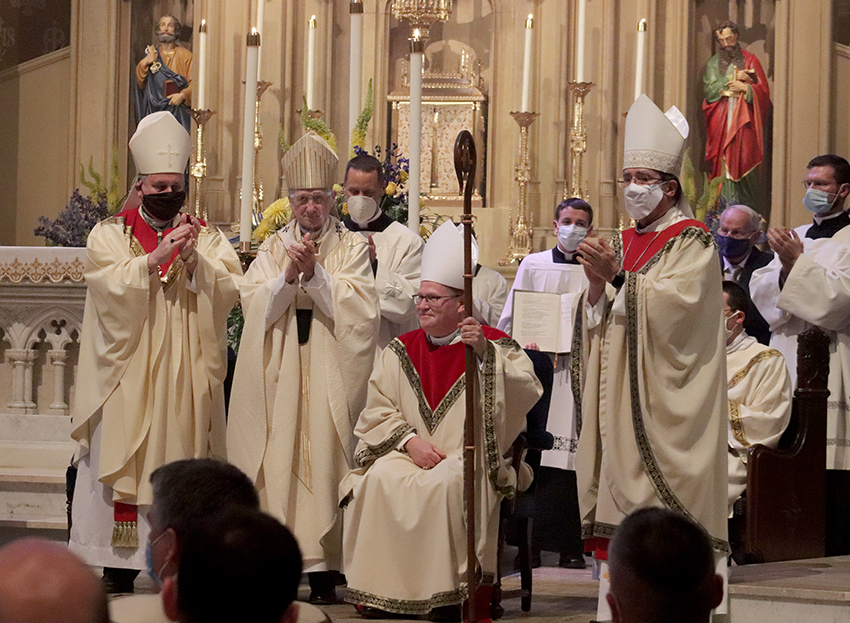
One year ago -- on July 23, 2020 -- newly ordained Bishop Louis Tylka received sustained applause following his ordination as Coadjutor Bishop of Peoria. Leading the applause were (from left) Archbishop Jerome E. Listecki of Milwaukee, Cardinal Blase Cupich of Chicago, and Archbishop Christophe Pierre, apostolic nuncio to the United States, the bishops who consecrated him. (The Catholic Post/Jennifer Willems)
EDITOR’S NOTE: Friday, July 23, will mark the first anniversary of the episcopal ordination of Father Louis Tylka, a priest of the Archdiocese of Chicago, as Coadjutor Bishop of Peoria. Despite much of his first year being shaped by the COVID-19 pandemic, it has been a very active 12 months for Bishop Lou, as he likes to be called. He has traveled extensively in the diocese and will continue to do so in the coming months as he assists — and prepares to eventually succeed — Bishop Daniel R. Jenky, CSC, the diocese’s chief shepherd.
As the anniversary date approached, Bishop Tylka reflected on his first year in an interview with The Catholic Post.
What is your most lasting or most treasured memory of the episcopal ordination celebration one year ago?
I think back to those days and there are a number of moments that are powerful. The nuncio (Archbishop Christophe Pierre) talking about how to pronounce my name. Cardinal (Blase) Cupich’s homily about returning to Galilee — that place that feeds us — was powerful to me.
One of the very powerful moments was one most people don’t know even happened. While we were waiting for the ceremony to start, three of my closest friends from Chicago who were my attendants prayed with me. They prayed very powerfully about, in essence, giving myself to this new church that I was going to serve. And they prayed in gratitude for my service to the church in Chicago, and for the gift of the Spirit to guide me.
It wasn’t scripted or planned. It was a moment we were able to share in the basement of the bishop’s residence as we were waiting for the procession to start. And it was very powerful for me.
Starting with the “Welcome Tour,” you have traveled widely across the diocese. How many miles have you put on your car in the past 12 months? Do you have any idea how many parishes you’ve visited thus far? How many confirmation Masses you’ve celebrated?
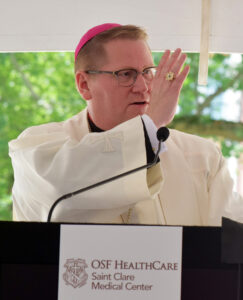
On one of his most recent actions in the diocese, Bishop Tylka blesses the crowd at the end of dedication ceremonies July 1 at OSF HealthCare Saint Clare Medical Center in Princeton. (The Catholic Post/Tom Dermody)
I estimate I came down to Peoria with roughly 4,000 miles on the car. Yesterday, I turned more than 30,000 miles. So it’s roughly somewhere upward of 26,000 miles since I started my life in Peoria.
I have been to 63 parishes. As of July 1, I was at 150 public events — school visits, celebrating Mass, funerals, confirmations, etc. And I have done 34 confirmations.
As we in the Diocese of Peoria have learned about you, I’m sure the past year has been quite an education for you. What has your first year as a bishop taught you about the following:
The responsibilities of a bishop?
I would answer that partly by saying the bishop is the chief shepherd of the diocese. The presence of the shepherd among the sheep is vital. The significance of that role in people’s lives is something that I haven’t appreciated until now.
When I was younger I would look at the bishop in awe. But having been a priest for 25 years, and because of my role on committees and such in the Chicago archdiocese, I got beyond the feeling that the bishop is this awesome figure and was comfortable calling them by their first names and knowing them as a regular guys. Not in any disrespectful way, but I was blessed to be able to relate to bishops of Chicago in a very informal, personal way.
The significance of the role of the bishop in people’s lives is something I’m still learning and adjusting to. The majority of people don’t relate to the bishop as someone they just had a bourbon with. The fact that my office has great significance to people is something I still have to appreciate even more.
As I will say to folks, “You don’t have to make a fuss over me,” but they do want to make a fuss over “the bishop.” I am that bishop now so they are making a fuss, in a sense, over me, and that makes me very uncomfortable. When I think of myself, I don’t feel worthy of that. I don’t need that. But because I am the bishop there is a need for them to be able to express their respect for the office and that role in the church.
The Diocese of Peoria?
The people of God down here are wonderful people. We have a great group of priests. We have generous people who are anxious to move forward. There is a love for the church that is really beautiful. There are a lot of good things happening across the diocese.
It is also somewhat a diverse diocese. We tend to narrowly look at things. We look at Chicago and think it’s just the city. We look at the Diocese of Peoria and think it’s just the country. That’s not the case. We have cities — Champaign, Bloomington, Peoria, the Quad Cities — but we also have the rural church. The diversity of our church is wonderful and the love that people have, whether they are in Raritan for a Harvest Mass or at the heart of Champaign for a Newman Center Mass, it’s a wonderful church that’s filled with faith and a lot of love and a lot of hope.
About yourself?
Too many lessons for The Post!
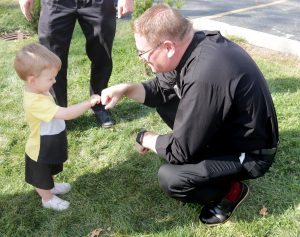
Bishop Tylka greets John Paul Cottingham with a fist bump during a “Welcome Tour” visit to the St. John Paul II Catholic Newman Center in Normal last October. (The Catholic Post/Jennifer Willems)
Being a bishop has put me in a lot of situations that would normally leave me feeling very uncomfortable, especially when people make a fuss over me. And yet I’m feeling surprisingly comfortable as I’m beginning to understand my life and role as a bishop. It’s almost like some acknowledgment or awareness of some gifts or talents that God has given to me that I certainly didn’t think I had in the past.
I don’t want to create some sense of false humility in that, but I do regularly wonder why God has put me in this position and what I’m going to be able to do with it.
How has your prayer life changed or deepened in the past year?
My prayer life has changed in the awareness of how dependent I am upon that time of prayer — especially my Holy Hour in the morning and calling upon the Holy Spirit throughout the day as I deal with the different issues that are presented.
I’ve said a couple of times in conversations over the last few months that I’ve never been more dependent than I am now upon other people praying for me. So many times in my life as a priest I’ve been asked to pray for people. Now, that sense of needing people’s prayers for me is so important and that does bolster me because there are a lot of things that we’re dealing with.
As an example, today I got a letter from a woman in Maryland that simply says “I prayed a rosary for you.” I don’t know who she is, I’ll probably never meet her, but for whatever reason in her own prayer life she feels compelled to pray for bishops and she sent a note to say she said a rosary for me. Those are the letters that I like to get!
What lessons have you learned from a year of working with Bishop Jenky?
Some of the things I’ve learned include to trust those around you. I’ve learned from him the importance of the collaboration a bishop has with his priests. And just the sense of the desire to serve the people of God. Especially as we dealt with a lot of the COVID stuff, I witnessed the great concern he showed in those conversations about what can we do, what should we do, as we were navigating that stuff.
Your first year was colored so much by the pandemic. You’ve written and spoken of it extensively. What are your hopes and concerns for the church as we, God willing, emerge from it?
Obviously the hope is we keep moving forward. And the hope is we also take with us the important lessons that we shared in that experience — our deep hunger for the Lord, especially in the Eucharist; our desire for community, to be connected with each other and to care for one another.
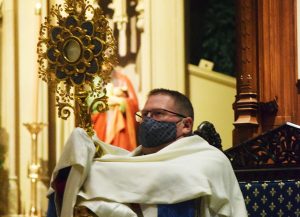
Bishop Tylka lifts the monstrance containing the Blessed Sacrament during a Holy Hour of diocesan prayer in a time of pandemic last December at St. Mary’s Cathedral. (The Catholic Post/Tom Dermody)
I think in some ways the pandemic opened to us the reality of the potential there is to be connected because we can livestream Mass or Zoom a Bible study. As good as those things are — and those are lessons we need to carry forward and use those technologies to help us — at the same time we can’t lose sight of how important that personal human interaction is. To be with somebody. To be able to have a conversation that is not through some technological medium, including the phone, but to be able to sit and actually talk to somebody.
My hope is that these are some of the lessons we need to create in the new normal in making sure we hold fast to the things that really do bring us together.
We’ve heard rumors of a second “Welcome Tour.” If so, what can you say about any plans for it?
The dates have been set, starting late August and going on for about six weeks. The whole purpose of the second “Welcome Tour” is to really be a listening session for me with people who are in parish leadership. I will go back to each of the 12 vicariates and probably even do one evening in Spanish, so 13 meetings. At each of the meetings, the trustees of the parish as well as two other parish leaders chosen by the pastor will be invited to attend. We’ll pray together briefly. Priests will not be invited. They had their chance last year.
Not everyone is going to have a chance to talk, so they are going to get four questions in advance which I’ll ask that they write out their responses to. And in the course of that evening, at least one person from each parish will be given the opportunity as the spokesperson to respond to one of those questions. They can also turn in those responses to me so I have the full picture of what each of the parishes are talking about.
It’s an opportunity to connect with the laity and parish leadership and hear some of their insights and wisdom as we continue to look to the future.
Your episcopal motto is “Go Make Disciples.” What might we expect in the coming year from you or the diocese that will help us all in that mission?
We’re looking at a lot of things. Any time there is a change in leadership, it’s natural that pretty much everything gets put on the table and you look at different pieces of the puzzle and see what we can build on or where we need to do some more work, put more attention.
Everything we do as a church these days needs to have as its heart a desire of evangelization. Every conversation about how we pray together in the liturgy, how we do faith formation — whether it’s in our Catholic schools or in our parish religious education programs, RCIA, adult formation — all of that has to ask the question: “How are we using these things to evangelize, to bring others to Jesus Christ?”
I think what you’ll see in the coming year is laying the groundwork where we begin to create that culture anew.
When July 23 comes around, how will you mark your anniversary?
On July 23 I will be in Ann Arbor, Michigan, to witness the first vows of members of the Dominican Sisters of Mary, Mother of the Eucharist. I figure it is a good way to mark one year for me as these women are professing their first vows, and then I’ll be flying back to Peoria that evening





